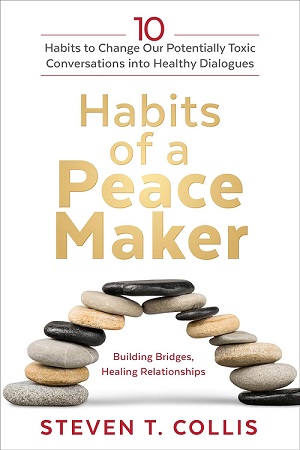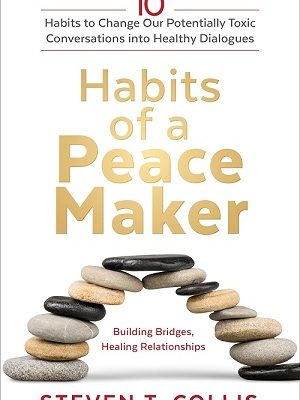
Read: Soul Poetry
1. Listen Actively
- The Power of Active Listening: Active listening is at the core of peaceful communication. Collis emphasizes that listening is not just about hearing words, but about fully understanding the speaker’s message. Active listening involves being present, making eye contact, and showing genuine interest.
- How to Practice Active Listening: Avoid distractions, refrain from interrupting, and ask clarifying questions. This habit fosters respect and creates a safe space for open dialogue, which helps reduce defensiveness and misunderstandings.
2. Assume Positive Intent
- Approach with Compassion: One of the most effective ways to de-escalate potentially toxic conversations is by assuming the other person has positive intentions. Collis explains that many misunderstandings arise when people assume malice where none exists.
- How to Apply This Habit: In a heated conversation, remind yourself that the other person may be operating from their own set of challenges or miscommunication. By giving them the benefit of the doubt, you can approach the dialogue with compassion and patience.
3. Respond, Don’t React
- The Difference Between Reaction and Response: A key habit for avoiding conflict is learning to respond thoughtfully instead of reacting impulsively. Collis emphasizes that reactions are often driven by emotion, while responses are thoughtful and intentional.
- How to Develop This Habit: Take a moment before responding in a conversation, especially if emotions are high. This pause allows you to assess the situation, manage your emotions, and craft a response that contributes to a positive outcome rather than escalating tension.
4. Use “I” Statements
- Focusing on Your Own Experience: “I” statements help to communicate feelings without placing blame on others. Collis explains that this approach reduces defensiveness and encourages openness in dialogue.
- How to Implement “I” Statements: Instead of saying “You always do this,” try “I feel upset when this happens.” This technique takes ownership of your emotions and shifts the conversation from accusatory to collaborative.
5. Seek to Understand, Not to Win
- Prioritize Understanding Over Winning: Many conversations turn toxic when the focus shifts to winning or proving the other person wrong. Collis argues that a peacemaker’s goal is to understand the other person’s perspective, not to dominate the conversation.
- How to Apply This Mindset: Ask yourself during a difficult conversation, “Am I trying to understand, or am I trying to win?” By focusing on understanding, you encourage collaboration and diminish conflict.
6. Manage Your Emotions
- Emotional Self-Regulation: Managing your emotions is essential to maintaining peaceful conversations. Collis stresses that unchecked emotions can lead to reactive, harmful exchanges, while emotional regulation fosters patience and calmness.
- How to Practice Emotional Management: Recognize when your emotions are intensifying and practice deep breathing, take a brief pause, or mentally step back to prevent emotions from controlling your responses. This helps to de-escalate potentially toxic conversations.
7. Agree to Disagree Respectfully
- Respecting Different Perspectives: Collis introduces the idea that it is okay to disagree, as long as both parties maintain respect for each other’s opinions. Disagreement does not have to lead to hostility if managed respectfully.
- How to Implement This Habit: If you find yourself at an impasse in a conversation, state your perspective clearly, while acknowledging that the other person has a right to their own views. Agree to disagree with mutual respect rather than forcing agreement or harboring resentment.
8. Apologize When Necessary
- The Power of a Genuine Apology: Collis explains that offering a sincere apology when you’ve hurt someone or made a mistake is a powerful tool for reconciliation and healing. Apologizing does not show weakness; it shows strength and maturity.
- How to Apologize Effectively: Acknowledge the specific action or words that caused harm, express regret, and commit to making changes. A genuine apology can defuse tension and build trust in relationships.
9. Practice Empathy
- Walking in Someone Else’s Shoes: Empathy is the ability to understand and share the feelings of another person. Collis emphasizes that practicing empathy is crucial in turning toxic conversations into compassionate dialogues.
- How to Cultivate Empathy: In conversations, try to see the situation from the other person’s perspective. Ask yourself how they might be feeling or what challenges they may be facing. This fosters connection and helps reduce conflict.
10. End on a Positive Note
- The Importance of Positive Closure: Ending a conversation on a positive note helps leave both parties feeling heard and respected. Collis explains that even in difficult conversations, finding a way to close with positivity can preserve the relationship and create opportunities for future healthy dialogues.
- How to Achieve Positive Closure: Express gratitude for the other person’s time, acknowledge their efforts to communicate, or reiterate a point of agreement. Ending positively keeps the door open for future conversations and reinforces mutual respect.



